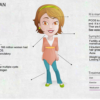 As a founder of Pcos2pregnancy with special research in PCOS and female infertility, one of the most common questions I am always being asked is :IN cases of women with PCOS/Insulin resistance and trying to Conceive ‘ Is Fruit BAD for them? The fact is, they are concerned about the sugars contains of FRUITS.
As a founder of Pcos2pregnancy with special research in PCOS and female infertility, one of the most common questions I am always being asked is :IN cases of women with PCOS/Insulin resistance and trying to Conceive ‘ Is Fruit BAD for them? The fact is, they are concerned about the sugars contains of FRUITS.
IT is a FACT, fruit does contain carbohydrates and a diet too high in carbs isn’t good for women with PCOS (or most people for that matter). But the sugar in fruit isn’t the same as regular old table sugar. In fact, comparing the two is like, well, comparing Fresh Apple to Apple pie!
Plain sugar like the one you put in your tea/coffee or use it to sweeten your oatmeal, is Sucrose. It is a carbohydrate that can be easily digested. When you eat sugar, it will quickly enters your blood stream resulting into a sharp rise in your blood sugar and insulin levels. It is absolutely Not good when you have PCOS.
But Fruits, on contrary, is composed of a different carbohydrates and fructose. Fruits also contain fiber which needs to be broken down by the body in order to use the fructose for energy so it takes your body longer to digest fruit. Differentiate between an Apple picked from a tree and a glass of apple juice? Both have the same amount of carbohydrates. Which would satisfy you more? Ofcourse APPLE!
Besides primary benefit of fiber, fruits also contain the most essential vitamins, minerals, and antioxidants in its pure form. In fact they can improve PCOS condition, lower insulin resistance and lower the risk for chronic diseases like cancer. As per the U.S. Dietary Guidelines recommend we eat a minimum of two servings of fruit each day for good health.
What counts as 1 fruit serving?
- 1 apple
- 1 avocado
- 1 cup of grapes
- 1 orange
- 1 large peach
- 1 cup strawberries
- 1 cup cherries
- 2 small plums
- 1 medium banana or ½ large banana
Now because fruit are carbohydrates, they shouldn’t be eaten all at once. A serving of smoothie is enough to meet your daily fruit requirement for the body.
Too many carbohydrates eaten at once, even if they come from fruit, will spike glucose and insulin levels. Instead, have a piece of fruit as a snack or add to a meal that is low in carbohydrate foods like strawberries with an omelet.
Fruits should be eaten with skin (apples, peaches, berries), because skin have a lower glycemic index. This means that it gets digested slower, and thus results in a slower rise in your glucose and insulin levels after eating. Fruits that you don’t eat the skin (pineapple, melon, watermelon) tend to have a higher glycemic index because they don’t contain as much fiber. This doesn’t mean these fruits are bad for you (they still contain nutrients), but should be eaten in moderation.
You may ask about Bananas? A large banana counts as two servings of fruit (like eating two apples at once).
Buy baby bananas or cut one regular sized banana in half. Bananas are rich in potassium, which regulates blood pressure, and are a good source of B vitamins, which help maintain blood sugar levels. They also help improve egg health. “
Tips how you can include healthy fruit options to your PCOS/Fertility diet.
- Keep a bowl of whole fruit on the table or counter. It’s more likely to be seen and eaten then when it is hidden in the fridge.
- Always Buy seasonal and local fresh fruit to maximize the nutrients and benefits from different types.
- Cut and Refrigerate fruits for daily use in the morning for later use during the day.
- Freeze fresh fruit into packs for preparing smoothies during the week. Enjoy for snacks.
- Add fruits to meals like top oatmeal with blueberries/strawberries or add apples & Avocado to a salad or a Sandwich.




